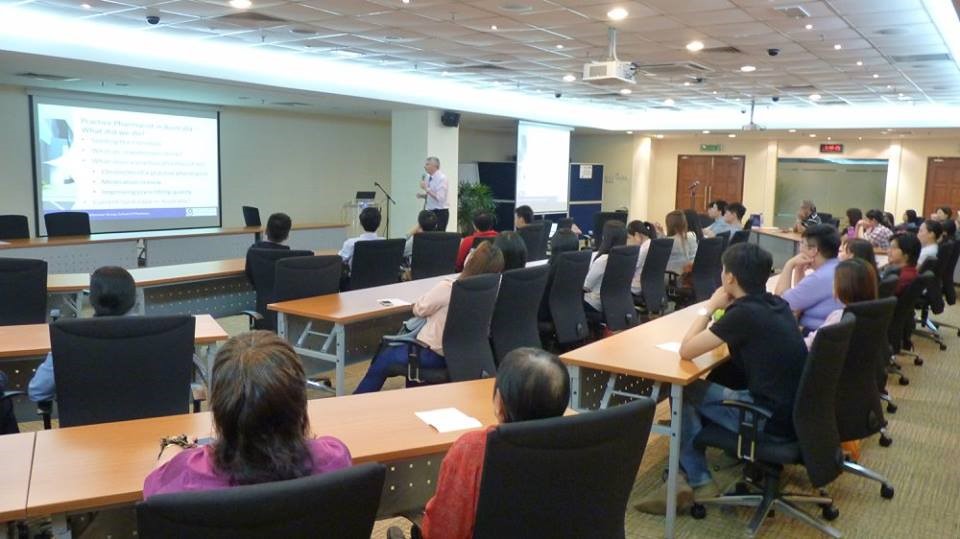25 May 2015- A talk entitled ‘Integration of a Pharmacist into General Practice Medical Centres: The Emerging Role of the Practice Pharmacist’ was held at the Senate Room of International Medical University (IMU)’s Bukit Jalil Campus. The talk is a joint collaboration of the Malaysian Pharmaceutical Society-Young Pharmacist Chapter (MPS-YPC) and IMU Alumni. It attracted an audience of nearly 60 people including a doctor and pharmacists as well as students from various IMU programmes, not only from pharmacy programme. Speaker, Dr Neil Cottrell spoke about the emerging role of pharmacists in primary care settings, giving a deep insight of the roles of pharmacists in a general practitioner’s (GP) practice, and how it has potentially grown to a multi-centre adoption. In this talk, Dr Neil Cottrell highlighted the evidences in Australia to support the integration of a pharmacist into general practice medical centers, which contributes to this role becoming known as a Practice Pharmacist. In this context the Practice Pharmacist delivers a range of clinical pharmacy services in collaboration with the General Practitioner and other healthcare providers in the general practice medical centres. The roles of Practice Pharmacist undertaken and outcomes to date, stakeholder perceptions of these roles and how this role is likely to develop in the future were discussed in the presentation. 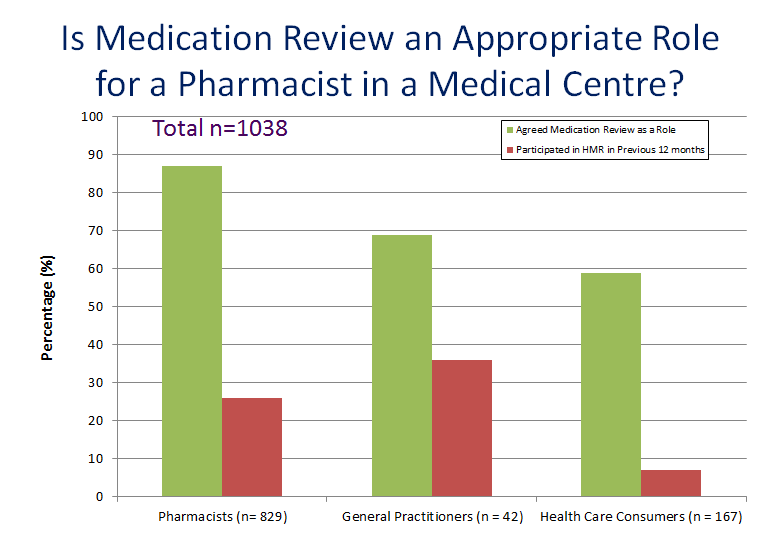 Based on a survey conducted on pharmacists, GPs, and healthcare consumers on the topic of a pharmacist integrated into the general practice setting, Dr Neil Cottrell brought our attention to the fact the participants agreed that Medication Review (MR) should be a role of the practice pharmacist and secondly that there are a large number of patients with chronic conditions who are underserviced with regards to having a MR. Apart from that, stakeholders also view Medication reconciliation, medication counselling sessions, patient medication profile generation, post hospital discharge follow up session, and adverse drug reaction follow up as part of the role of a Practice Pharmacist.
Based on a survey conducted on pharmacists, GPs, and healthcare consumers on the topic of a pharmacist integrated into the general practice setting, Dr Neil Cottrell brought our attention to the fact the participants agreed that Medication Review (MR) should be a role of the practice pharmacist and secondly that there are a large number of patients with chronic conditions who are underserviced with regards to having a MR. Apart from that, stakeholders also view Medication reconciliation, medication counselling sessions, patient medication profile generation, post hospital discharge follow up session, and adverse drug reaction follow up as part of the role of a Practice Pharmacist. 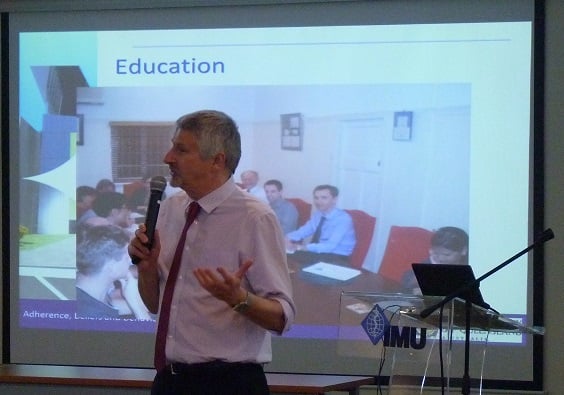 Nevertheless, with any new model, it is crucial to first gain an understanding of the potential barriers and enablers. Identified through Focus groups, interviews and questionnaires (including pharmacists, GPs, Patients, and practice managers), the biggest barrier revolved around lack of appropriate funding for the services for the model to be sustainable. While remuneration is one of the vital enablers in this context, careful consideration has to be done as the charges for service could limit services offered. In addition, training, not only of the pharmacist but of the medical centre and medical team, has to be carried out in order to provide a trustworthy, professional service for the patients. In short, having a define scope of practice and a framework built around this model pushes this idea to reality. Last but not least, Dr Neil Cottrell ended his talk by highlighting the great opportunity for practice pharmacists to be recognised as individual practitioners. Research to-date in Australia indicates that the role of Practice Pharmacist has benefits to the healthcare service with the evidence that encompasses health and economic outcomes.
Nevertheless, with any new model, it is crucial to first gain an understanding of the potential barriers and enablers. Identified through Focus groups, interviews and questionnaires (including pharmacists, GPs, Patients, and practice managers), the biggest barrier revolved around lack of appropriate funding for the services for the model to be sustainable. While remuneration is one of the vital enablers in this context, careful consideration has to be done as the charges for service could limit services offered. In addition, training, not only of the pharmacist but of the medical centre and medical team, has to be carried out in order to provide a trustworthy, professional service for the patients. In short, having a define scope of practice and a framework built around this model pushes this idea to reality. Last but not least, Dr Neil Cottrell ended his talk by highlighting the great opportunity for practice pharmacists to be recognised as individual practitioners. Research to-date in Australia indicates that the role of Practice Pharmacist has benefits to the healthcare service with the evidence that encompasses health and economic outcomes. 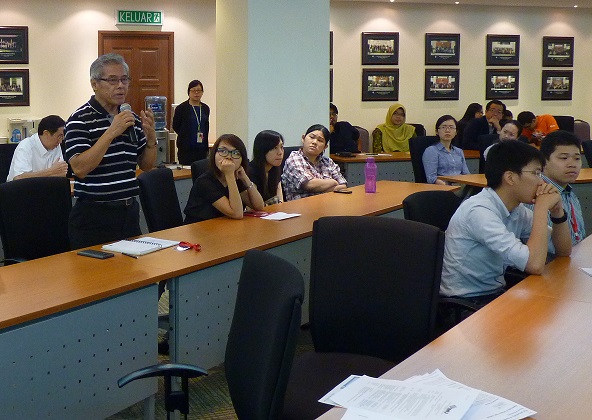 The talk by Dr Neil Cottrell is an encouraging and enlightening one that triggered an overwhelming response in the Question and Answer session. An enquiry from Mr. Andrew Tan, the Vice President of Malaysian Pharmaceutical Society (MPS) revealed a concern on the benefits of a Practice Pharmacist in terms of payment and remuneration. Mr. John Chang Chiew Pheng, immediate Past President of Federation of Asian Pharmaceutical Associations (FAPA) and current MPS council member also invited Dr. Neil Cottrell to share his view on the collaborative integration of GP and pharmacist and to explain the difference of pharmacist practice in countries such as Australia and United Kingdom. Dr. Neil Cottrell put a finishing touch to his answers by adding that all healthcare professional should work as a team for the benefit of the patients. The interesting talk nonetheless prompted a question from a first year pharmacy student, asking about the practicability of having a platform for GP and pharmacist to work together in Malaysia. The answer from Dr Neil Cottrell suggests that coaching and change, notwithstanding time to create the environment and network will be necessary for the transformation. Lastly, Dr. Norman Chieng Heng Liang, Programme Coordinator of School of Pharmacy of IMU seized this opportunity to invite Dr. Neil Cottrell to give a piece of advice for current students.
The talk by Dr Neil Cottrell is an encouraging and enlightening one that triggered an overwhelming response in the Question and Answer session. An enquiry from Mr. Andrew Tan, the Vice President of Malaysian Pharmaceutical Society (MPS) revealed a concern on the benefits of a Practice Pharmacist in terms of payment and remuneration. Mr. John Chang Chiew Pheng, immediate Past President of Federation of Asian Pharmaceutical Associations (FAPA) and current MPS council member also invited Dr. Neil Cottrell to share his view on the collaborative integration of GP and pharmacist and to explain the difference of pharmacist practice in countries such as Australia and United Kingdom. Dr. Neil Cottrell put a finishing touch to his answers by adding that all healthcare professional should work as a team for the benefit of the patients. The interesting talk nonetheless prompted a question from a first year pharmacy student, asking about the practicability of having a platform for GP and pharmacist to work together in Malaysia. The answer from Dr Neil Cottrell suggests that coaching and change, notwithstanding time to create the environment and network will be necessary for the transformation. Lastly, Dr. Norman Chieng Heng Liang, Programme Coordinator of School of Pharmacy of IMU seized this opportunity to invite Dr. Neil Cottrell to give a piece of advice for current students. 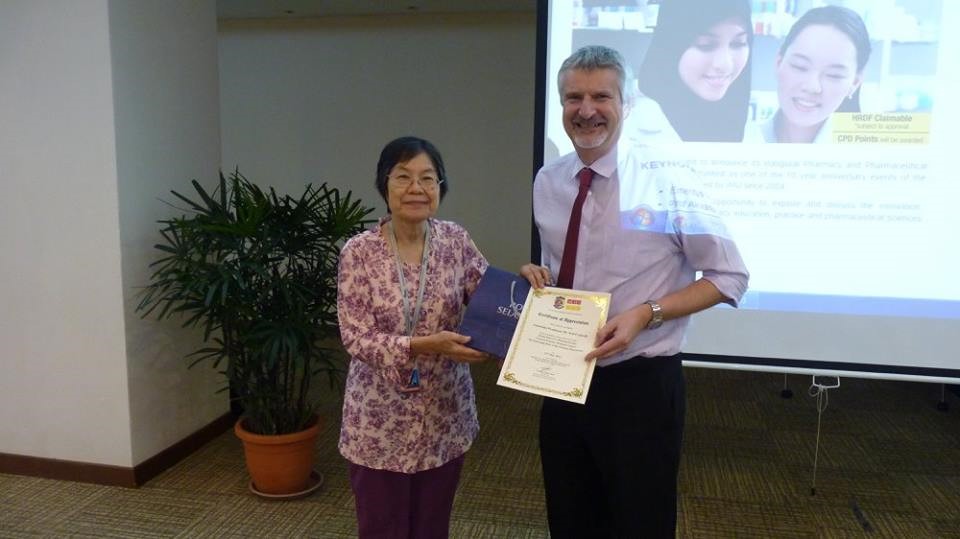 Dr Neil Cottrell is an Associate Professor in the School of Pharmacy, University of Queensland and is currently the acting Head of School. He has extensive experience as a clinical pharmacist practitioner and manager of clinical pharmacy services in teaching hospitals in the United Kingdom and Australia (specialised in general medical, renal, geriatric, cardiac, endocrinology and intensive care wards). In 2007, he received the Australian Clinical Pharmacy Award from the Society of Hospital Pharmacists of Australia. He teaches cardiovascular disease therapeutics to third year students and is the course coordinator for Patient Centred Integrated Care, a capstone course for the fourth year students. In 2013 he received a University of Queensland Teaching Excellence award. Dr Neil Cottrell has two major research themes within Quality Use of Medicines in the School of Pharmacy; (1) better understanding medication non-adherence with a particular focus on how patient’s beliefs and behaviour impact on this and (2) the roles for pharmacists in the Australian healthcare setting, specifically pharmacist working in a collaborative model in a general practice setting in Australia.
Dr Neil Cottrell is an Associate Professor in the School of Pharmacy, University of Queensland and is currently the acting Head of School. He has extensive experience as a clinical pharmacist practitioner and manager of clinical pharmacy services in teaching hospitals in the United Kingdom and Australia (specialised in general medical, renal, geriatric, cardiac, endocrinology and intensive care wards). In 2007, he received the Australian Clinical Pharmacy Award from the Society of Hospital Pharmacists of Australia. He teaches cardiovascular disease therapeutics to third year students and is the course coordinator for Patient Centred Integrated Care, a capstone course for the fourth year students. In 2013 he received a University of Queensland Teaching Excellence award. Dr Neil Cottrell has two major research themes within Quality Use of Medicines in the School of Pharmacy; (1) better understanding medication non-adherence with a particular focus on how patient’s beliefs and behaviour impact on this and (2) the roles for pharmacists in the Australian healthcare setting, specifically pharmacist working in a collaborative model in a general practice setting in Australia.




